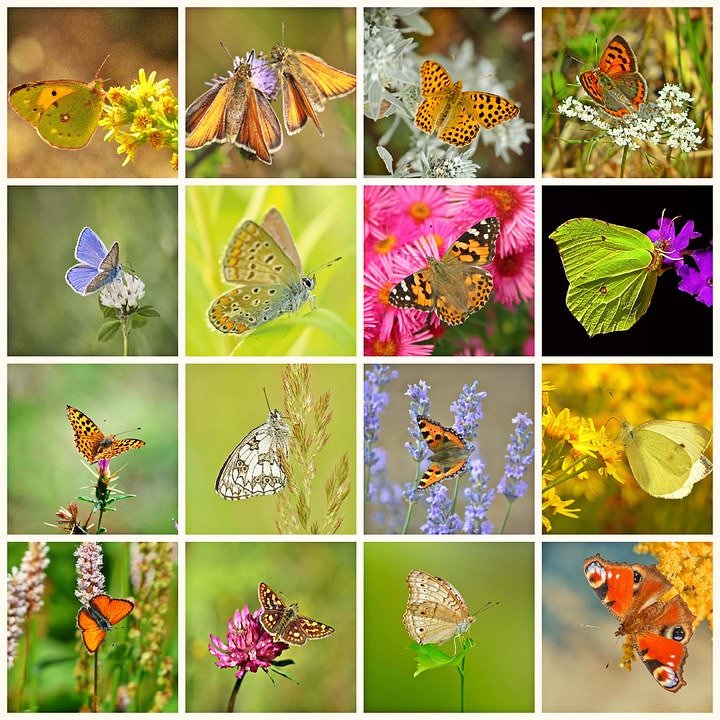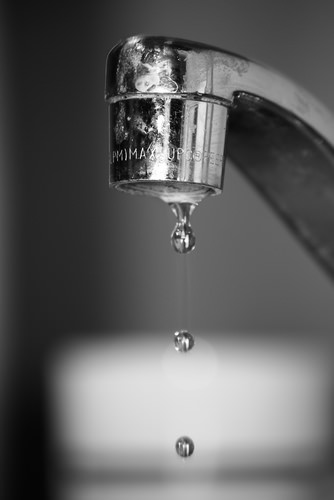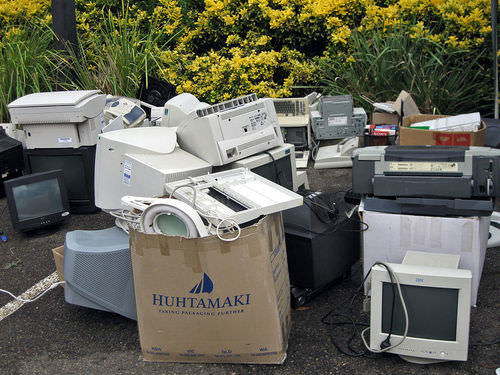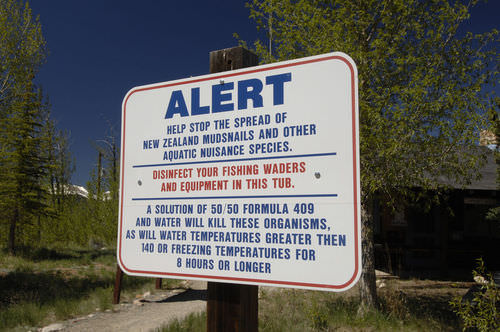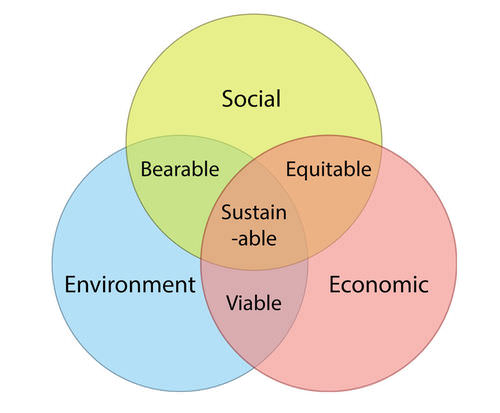18.40 保护生物多样性 -- -- 高级
章节大纲
-
Why is important?
::为什么重要?There are numerous reasons. What can happen in an even if just one disappears? How does this affect the balance in that ecosystem? How does this affect us? What about all the species we do not even know anything about? What information is lost if those species vanish? All of these are important questions.
::有很多原因。 即使只有一个人消失, 还能发生什么? 这对生态系统的平衡有何影响? 这对我们有何影响? 我们不知道的物种呢? 如果这些物种消失, 将失去什么信息? 所有这些都是重要的问题。Protecting Biodiversity
::保护生物多样性Consider the following facts from the American Museum of Natural History’s Center for Biodiversity and (AMNH-CBC) and the Environmental Protection Agency (EPA):
::考虑美国自然历史博物馆生物多样性中心(AMNH-CBC)和环境保护局(EPA)的下列事实:- Every year, Americans:
-
Throw away at least 2 billion disposable razors
::丢弃至少20亿可支配剃刀 -
Discard enough paper and wood to heat 5 million homes for 200 years
::丢弃足够的纸纸和木柴,使500万户家庭供暖200年 -
Drink more than two billion gallons of bottled
, costing 900 times more money than tap water – not counting the
energy
and toxics involved in packaging and shipping
::与自来水相比, 成本比自来水高出900倍 — — 不算包装和运输所涉及的能源和有毒物质。 -
Retire up to 130 million
phones, containing toxic metals such as arsenic, cadmium, and lead
::报废多达1.3亿部手机,其中含有砷、镉和铅等有毒金属 -
Generate about 3 million tons of toxic electronics waste (e-waste), and recycle only about 11%
::产生约300万吨有毒电子废物(电子废物),回收率仅约11%
Do any of these everyday experiences apply to you? You may be surprised to learn there is quite a lot you can do to help. Read carefully through the suggestions below, noting those that appeal to you strongly and those which seem most feasible. Many involve little more than awareness in decisions you already or will soon make.
::这些日常经历是否适用于你?你可能惊讶地知道,你可以帮上很多忙。仔细阅读下面的建议,指出那些强烈吸引你的建议和那些似乎最可行的建议。许多建议只涉及你已经或即将做出的决定中的认识。Consume Thoughtfully and Wisely
::智商和智慧的融合Reduce Your Consumption Where Possible. Re-use, and Recycle. Make Durability and Efficiency Your Criteria for Product Purchases
::尽可能减少消费,再使用和再循环,使可变性和效率成为购买产品的标准In general, when you buy:
::一般而言,购买时:-
Buy locally whenever possible to reduce transportation costs for you and for the environment.
::只要有可能,就在当地购买,以降低您和环境的交通成本。 -
Be aware of the
natural resources
used to make and transport any product you buy.
::请注意用于制造和运输您购买的任何产品的自然资源。 -
Substitute other materials for plastics - which are made from petroleum and produce toxic waste.
::替代塑料的其他材料----用石油制成,产生有毒废物。
Eat with the environment and your health in mind! In the United States, the Department of Agriculture (USDA) sets standards for organic products and certification. The green-and-white seal identifies products which have at least 95% organic ingredients. The program is helpful to consumers, but not without controversy (read Barbara Kingsolver’s Animal, Vegetable, Miracle, and/or Michael Pollan’s Omnivore’s Dilemma ).
::以环境和健康为出发点吃饭! 在美国,农业部(USDA)制定了有机产品和认证标准。 绿色和白色海豹确定了至少有95%有机成分的产品。 该计划对消费者有帮助,但并非毫无争议(阅读Barbara Kingsolver的动物、蔬菜、奇迹和/或Michael Pollan的Omnnivore的Dilemma ) 。When you buy food , plan your diet for your own health and that of the environment. Eat low on the ; top carnivores get the least energy and acquire the most poison. Buy local produce in season – to reduce transportation costs and the need for pesticides. Buy produce at farmers’ markets or a Community Supported (CSA) programs to support local farmers and reduce demand for energy-consuming and polluting large-scale agriculture and marketing. Choose organic produce - for your own health and to protect the environment from excessive nutrients and pesticides ( Figure ).
::当您购买食物时,请为自身健康及环境制定饮食计划。低食量;顶级食肉动物获得的能量最少,获得的毒药最多。在季节购买本地产品 — — 以降低运输成本和杀虫剂需求。 在农民市场或社区支持方案(CSA)购买农产品,以支持本地农民,减少对耗能和污染大规模农业及营销的需求。选择有机产品 — — 为自身健康着想,并保护环境免受过度养分和杀虫剂(图 ) 。When you buy for food or for your aquarium, check to be sure that commercial species are not from over harvested areas, and verify that saltwater fish were not collected using cyanide.
::购买食物或水族馆时,请检查商业物种是否来自过度采伐地区,并核实盐水鱼类是否使用氰化物采集。When you need paper products, be sure they are made of recycled fiber, or consider alternative materials such as hemp, kenaf, cornstarch, or old money or maps. Replace paper napkins and paper towels with cloth materials. Reuse envelopes and boxes. Wrap gifts in the comics or reusable cloth gift bags.
::当您需要纸质产品时,请务必确定这些产品是用回收纤维制成的,或考虑其他材料,如大麻、kenaf、玉米、旧钱或地图。用布料替换纸巾和纸巾。重新使用信封和盒子。将礼品包装在漫画或可再用布袋中。When you buy products for cleaning, painting, or washing your car, check the ingredients to be sure you are not exposing yourself and the environment to unnecessary toxins. Vinegar and baking soda work wonders!
::购买清洁、油漆或洗车用的产品时,请检查成分,以确保您不会暴露自己和环境受到不必要的毒素的影响。醋和烘烤汽水的工作奇迹!When you buy wood or wood products, be sure harvesting followed sustainable forest management practices which ensure future productivity, biodiversity, and ecosystem health. Look for SmartWood, FSC (Forest Stewardship Council) or similar labels, and consider recycled or salvaged wood.
::在购买木材或木制品时,要保证采伐遵循可持续的森林管理做法,确保未来的生产力、生物多样性和生态系统健康。 寻找SmartWood、FSC(森林管理委员会)或类似标签,并考虑回收或回收的木材。One drop per second from a dripping faucet wastes 2,700 gallons of water per year and adds to sewer and/or septic costs, as well.
::每年从滴水龙头废物中每秒下降一滴2,700加仑的水,也增加了下水道和/或化粪池的费用。When You Use Water, Remember Its Importance To All Life
::当你用水时,记住水对所有生命的重要性-
Check for water leaks and repair drips with new washers (
Figure
).
::检查漏水情况,用新的洗衣机修补滴水(图)。 -
Use low-flush toilets and low-flow faucets and shower heads.
::使用低潮马桶、低流水龙头和淋浴头。 -
Have your tap water tested; use filters or refillable delivery if needed, rather than bottled water.
::请对自来水进行测试;必要时使用过滤器或可再充填的交付,而不是瓶装水。
When You Must Use Energy, Consider Consequences and Choose Your Source Carefully
::当您必须使用能源, 仔细考虑后果和选择来源时-
Unplug electronic equipment such as fax machines, power tools, and anything connected to a remote control.
::拔除电子设备,如传真机、电动工具以及与遥控器有关的任何设备。 -
Turn off power sources and lights when not in use.
::不使用电源和灯光时关闭电源和灯光。 -
Use your bicycle, and support bike-friendly cities and roads.
::使用您的自行车, 支持自行车友好型城市和道路。 -
Walk! It’s good for you, as well as the environment.
::走!这对你有好处, 环境也是一样。 -
Use public transportation, and support its expansion.
::使用公共交通,支持其扩展。 -
Make energy-efficiency your #1 priority when you purchase appliances.
::购买电器时, 将节能作为第1号优先。 -
Make fuel-efficiency your #1 priority if you purchase a car.
::购买汽车时,要优先提高燃料效率。 -
Turn down your thermostat, especially at night. Just 2
o
F saves 500 pounds of greenhouse-inducing CO
2
!
::关掉你的自动调温器,特别是晚上,只要2oF就省下500磅温室排放二氧化碳! -
Weatherstrip and caulk doors and windows.
::天气和洞穴的门和窗户。 -
Replace incandescent with fluorescent light bulbs, which are four times as efficient and last far longer.
::用荧光灯泡取代白日灯,荧光灯泡的效能是荧光灯泡的四倍,最长更长。 -
The EPA Energy Star Logo helps consumers to identify energy-efficient products. The less
fossil fuel
energy we use, the fewer
greenhouse gases
we release, reducing the threat of
climate
change.
::环保局的能源之星(Energy Star Logo)帮助消费者识别节能产品。 我们使用的化石燃料能源越少,排放的温室气体就越少,气候变化的威胁也就越小。
Computer equipment becomes obsolete quickly and contains toxins such as lead and mercury. Consider donating your obsolete equipment, and if you must discard it, be sure you follow specific guidelines for recycling and hazardous waste disposal.
::计算机设备很快过时,并含有铅和汞等毒素。考虑捐赠您的陈旧设备,如果必须丢弃,请务必遵守再循环和危险废物处置的具体准则。When You Must Dispose of Waste, Learn the Best Practice for Its Disposal
::当您必须丢弃废物时, 学习处理废物的最佳做法-
Reduce or eliminate your use of plastic bags, sandwich bags, and six-pack plastic rings (and don’t release balloons!) so that endangered sea
do not mistake these for their favorite food - jellyfish.
::减少或消除使用塑料袋、三明治袋、六包塑料环(不要释放气球! ), -
Minimize and compost food waste.
::尽量减少和堆肥食品浪费。 -
Recycle motor oil and unused paint.
::回收机动油和未使用的油漆。 -
Use appropriate local hazardous waste facilities for recommended chemicals and medicines.
::为推荐化学品和药品使用适当的当地危险废物设施。 -
Donate obsolete computers and other electronic equipment – or if you cannot, recycle such “e-waste” properly (
Figure
).
::捐赠过时的计算机和其他电子设备,或者在无法这样做时,适当回收这种“电子废物”(图)。
Don’t Contribute to the Burgeoning Problem of Exotic Species
::避免助长外来物种的布尔金问题(The following points reference Figure .)
:以下各点参考图.)
-
Don’t release aquarium fish, turtles,
, or other pets into the wild.
::不要将水族馆鱼、海龟或其他宠物放入野外。
Exotic (invasive or alien) species are often considered the #2 cause of extinction. Learn how to avoid transporting them!
::外来(入侵或外来)物种通常被视为灭绝的第二原因。 学习如何避免运输它们 !-
Clean your boat thoroughly after use, and avoid traveling with wild plants and
.
::使用后彻底清理你的船, 并避免旅行 与野生植物和. -
Your pet is also considered to be an
exotic species
. Don’t let your pets hunt birds or wild animals.
::您的宠物也被认为是一种外来物种。 不要让宠物猎杀鸟类或野生动物。
Practice Sustainable Management on Your Own Land, Even If it is “Only” a Small Yard
::在自己的土地上实行可持续管理,即使它“只是”一个小场-
Minimize nonpoint source pollution by using organic or natural pesticides and fertilizers.
::通过使用有机或天然杀虫剂和肥料,尽量减少非点源污染。 -
Plant shade trees for air-
conditioning
and to absorb CO
2
.
::用于空调和吸收二氧化碳的树荫树。 -
Water plants and lawns in the evening.
::晚上有水厂和草坪 -
Better yet, use native and/or drought-tolerant plants for landscaping.
::最好利用本地和(或)耐旱植物进行景观美化。 -
Remember that City, County, State, and Federal lands are your lands, too. Get involved in local zoning and land use planning to ensure that
follows sustainable guidelines.
::记住,城市、县、州和联邦土地也是你们的土地。 参与地方分区和土地使用规划,以确保遵循可持续准则。
Sustainability as a goal in decision-making seeks the intersection of three sets of values. The environmental component includes maintaining ecosystem quality indefinitely.
::作为决策的一个目标,可持续性寻求三套价值的交叉,环境组成部分包括无限期地保持生态系统质量。Adopt and Spread Sustainable Perspectives and Philosophy
::采用和传播可持续观点和哲学-
Focus on diversity as a whole –
genes
, communities and ecosystems – rather than single “poster” species.
::关注多样性作为一个整体 — — 基因、社区和生态系统 — — 而不是单一的“后传”物种。 -
Support the inclusion of ecosystems services in economic valuations.
::支持将生态系统服务纳入经济估值。 -
Encourage protection of areas large enough to accommodate
, flooding, buffer zones, pollution from nearby development, and people and their activities.
::鼓励保护大到足以容纳洪水、缓冲区、附近发展造成的污染以及人民及其活动的地区。 -
Realize that inequitable distribution of
, land, resources, education, and wealth threatens biodiversity.
::认识到土地、资源、教育和财富的不公平分配威胁到生物多样性。 -
Promote the concept of sustainability as a guide for conservation decisions (
Figure
).
::推动可持续性概念,作为养护决定的指南(图)。 -
Join philosophers and religious and community groups to explore environmental ethics.
::与哲学家、宗教团体和社区团体一起探讨环境伦理问题。 -
Help
everyone
understand basic
ecology
and the wealth of biodiversity shaped by billions of years of evolution.
::帮助每个人了解基本生态和数十亿年演变形成的生物多样性财富。
Learn More!
::学习更多!-
About the species with which you share the Earth.
::关于你与地球共享的物种 -
About local, national, and international threats to biodiversity
::关于地方、国家和国际对生物多样性的威胁 -
About more solutions as they develop
::随着解决方案的发展,关于更多的解决方案 -
Jump in! Join local groups which monitor ecosystem health:
Frog
Watch, River Watch, or Bird Counts.
::跳跃! 加入监测生态系统健康的地方团体: 青蛙观察、河观察或鸟类伯爵。 -
Educate yourself about complex issues such as government subsidies and new technologies.
::教育自己了解政府补贴和新技术等复杂问题。 -
Find out about local protected lands and volunteer your time and energy to restore native ecosystems.
::寻找当地受保护的土地 并自愿投入你的时间和精力 来恢复当地生态系统
Activate!
::启动!-
your citizenship to protect biodiversity. Vote,
communicate
your views, and push for stronger environmental protection laws.
::投票,表达你的观点,推动制定更强有力的环境保护法律。 -
Support organizations which promote national reserves, international treaties, and resource conservation.
::支持促进国家储备、国际条约和资源保护的组织。 -
Support efforts by zoos, arboretums, museums and
seed
banks to help maintain
genetic diversity
through research, breeding, educational, and fundraising programs.
::动物园、直肠、博物馆和种子库通过研究、育种、教育和筹资方案,支持动物园、直肠、博物馆和种子库努力帮助维持遗传多样性。
Summary
::摘要-
After reducing consumption and reusing and recycling, careful consumption can help to conserve ecosystems.
::在减少消费、再利用和再循环之后,谨慎的消费有助于保护生态系统。 -
Our daily activities and decisions can significantly help to protect biodiversity.
::我们的日常活动和决定可大大有助于保护生物多样性。 -
Local, seasonal products save energy costs for transportation.
::当地季节性产品节省了运输的能源费用。 -
Durable and efficient products reduce long-term resource consumption.
::耐久和高效的产品可减少长期资源消耗。 -
Wise use of water resources helps to prevent desertification of ecosystems.
::明智地利用水资源有助于防止生态系统荒漠化。 -
Energy alternatives to fossil fuels reduce greenhouse gases, although nuclear energy has its own dangers.
::替代矿物燃料的能源减少温室气体,尽管核能本身有其危险。 -
After minimizing waste, best practices for waste disposal ensure less pollution of ecosystems.
::在尽量减少废物之后,废物处理的最佳做法可确保减少生态系统的污染。 -
The threats to biodiversity posed by exotic species mean that everyone should learn to avoid transporting them.
::外来物种对生物多样性构成的威胁意味着每个人都应学会避免运输。 -
Sustainable management of land, from small yards to local, state, and federal lands, conserves ecosystems.
::从小码到地方、州和联邦土地的可持续管理保护着生态系统。 -
Sustainability as a guide for decision-making balances social, economic, and environmental values to structure human activities such that they can continue indefinitely.
::可持续性是决策平衡社会、经济和环境价值的指南,用以构建人类活动的结构,使其可以无限期地继续下去。 -
Learning about biodiversity and ecology is an important part of valuing and protecting the diversity of life.
::关于生物多样性和生态学的学习是重视和保护生命多样性的一个重要部分。 -
Voting, membership in conservation organizations, and working toward protective legislation can contribute to genetic, species, and ecosystem diversity.
::投票、成为保护组织的成员以及努力制定保护性立法,可以促进遗传、物种和生态系统多样性。
Review
::回顾-
“Reduce, Re-use, and Recycle” is so familiar to many people that it has lost much of its meaning. Yet it remains an efficient summary of the best conservation principles. Explain. Choose one new idea to add to these workhorses.
::“减少、再利用和回收”对于许多人来说是如此熟悉,以至于失去了它的许多意义。然而,它仍然是最佳养护原则的有效总结。解释。选择一种新想法加入这些工作马。 -
What ecological principles can govern your food choices to help protect your health, biodiversity, and even global stability?
::在帮助保护健康、生物多样性甚至全球稳定方面,你们的粮食选择有哪些生态原则可以指导? -
How does the concept of sustainable use differ from “reduce, reuse, and recycle”? How is it similar?
::可持续使用的概念与“减少、再利用和再循环”有何不同?它如何相似? -
According to Barry Commoner, there are Four Laws of Ecology. Explain how his laws govern the way nature does – and humans should – use energy and material resources in order to protect biodiversity. The Four Laws of Ecology:
-
Everything is connected to everything else.
::所有的一切都与其它一切相关联。 -
Everything must go somewhere.
::一切都必须去某个地方。 -
Nature knows best.
::大自然知道的最多。 -
There is no such thing as a free lunch.
::没有免费午餐这种东西。
::巴里·普纳(Barry Commer)认为,有四种生态法则。 解释一下他的法律如何管理自然使用能源和物质资源以保护生物多样性的方式 — — 以及人类应该如何使用。 四种生态法则:一切事物都与其它一切相联。 万物必须去某个地方。 大自然最清楚。 没有免费午餐这样的东西。 -
Everything is connected to everything else.
